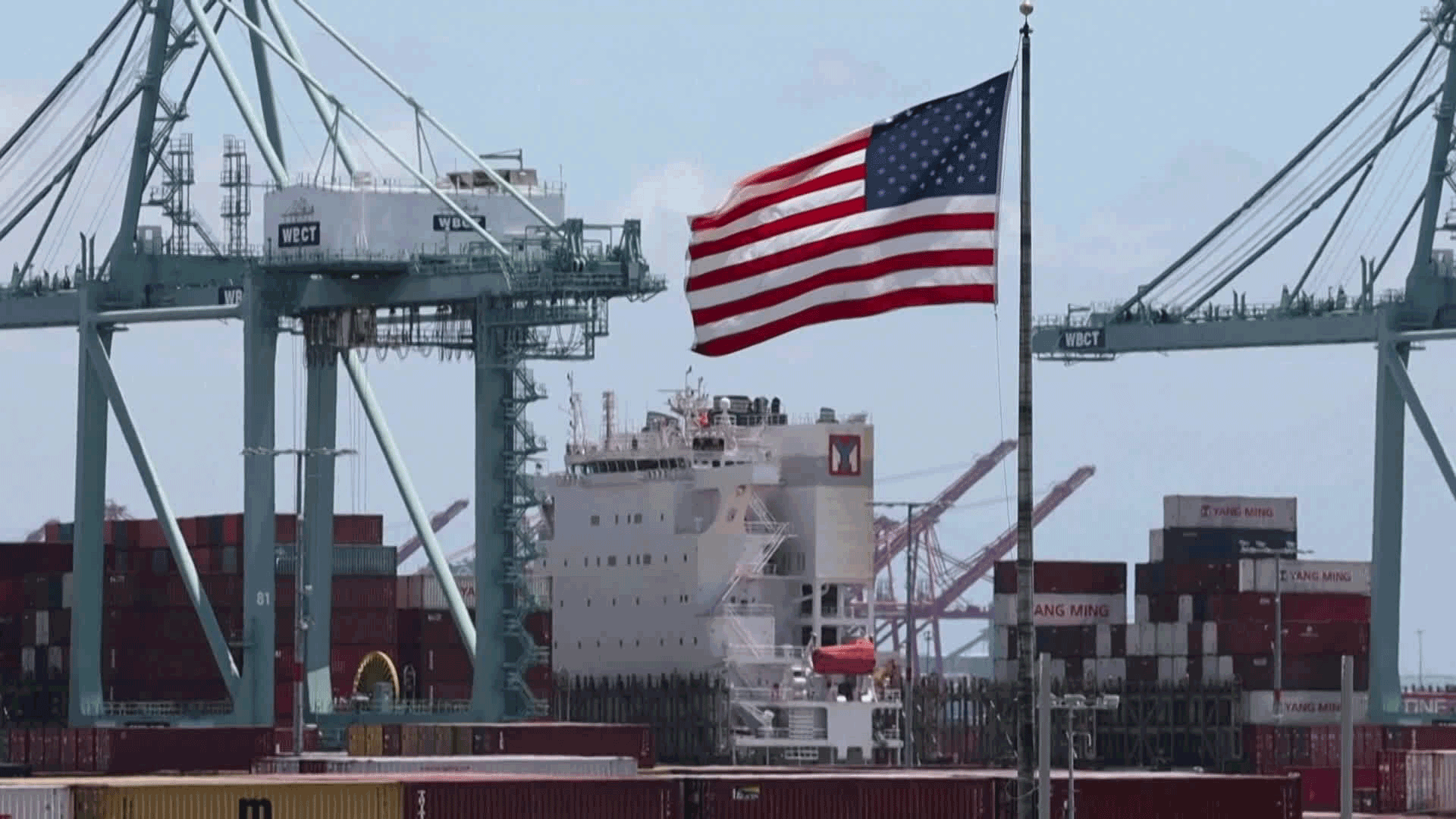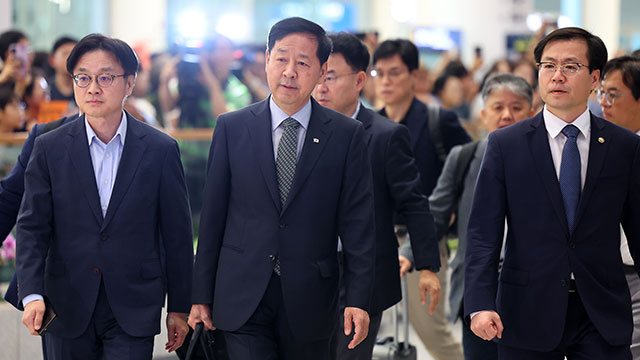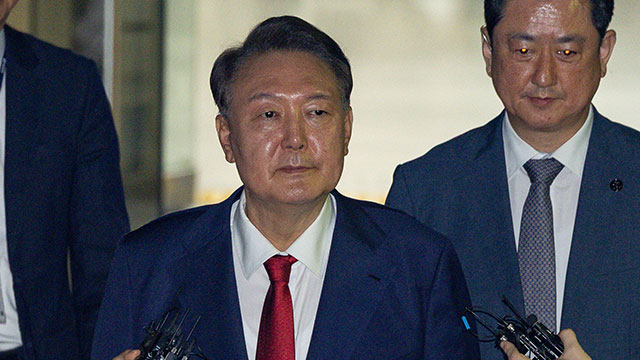[Anchor]
With the conclusion of this negotiation, we have temporarily avoided a storm, but there are evaluations that the Korea-U.S. FTA has effectively been rendered powerless.
As the framework of Korea-U.S. trade changes, there are analyses suggesting that the outlook for many industries, except for shipbuilding, is not bright.
Reporter Kim Min-kyung has the details.
[Report]
The Korea-U.S. Free Trade Agreement, or FTA, was concluded in April 2007 and came into effect in March 2012.
[Kim Hyun-jong/Former Trade Minister/Apr. 2007: "We have completed the Korea-U.S. FTA negotiations that will open a new era."]
Since then, over a decade, the trade volume of goods between the two countries has increased by about 68% as tariffs gradually decreased to 0%, with South Korea's investment in the U.S. tripling and U.S. investment in South Korea doubling.
Automobiles, petroleum products, and secondary batteries have secured price competitiveness and led exports.
However, with this tariff negotiation, the FTA has become ineffective.
[Kim Yong-beom/Presidential Chief of Staff for Policy: "The FTA is currently quite shaken."]
With this agreement, only the shipbuilding industry is positively affected, while the outlook for many industries, including automobiles, semiconductors, and home appliances, is bleak.
In particular, the steel industry is expected to be hit hard as Nippon Steel acquires U.S. Steel, securing a stable supply source in the U.S.
[Seok Byeong-hoon/Professor of Economics at Ewha Womans University: "South Korea has no (steel) production facilities in the U.S. So, we have to face a 50% tariff as it is..."]
The government believes that while we have avoided a storm this time, the U.S. is likely to continue its pressure by strengthening protectionism and attempting to restructure supply chains.
[Kim Hyung-joo/Head of Economic Policy Division at LG Business Research: "Under the already established environment, we need to focus more on efforts to absorb the advantages that the U.S. has."]
There are also concerns that expanding investment in the U.S. could lead to a contraction in domestic investment and a decrease in jobs.
This is KBS News, Kim Min-kyung.
With the conclusion of this negotiation, we have temporarily avoided a storm, but there are evaluations that the Korea-U.S. FTA has effectively been rendered powerless.
As the framework of Korea-U.S. trade changes, there are analyses suggesting that the outlook for many industries, except for shipbuilding, is not bright.
Reporter Kim Min-kyung has the details.
[Report]
The Korea-U.S. Free Trade Agreement, or FTA, was concluded in April 2007 and came into effect in March 2012.
[Kim Hyun-jong/Former Trade Minister/Apr. 2007: "We have completed the Korea-U.S. FTA negotiations that will open a new era."]
Since then, over a decade, the trade volume of goods between the two countries has increased by about 68% as tariffs gradually decreased to 0%, with South Korea's investment in the U.S. tripling and U.S. investment in South Korea doubling.
Automobiles, petroleum products, and secondary batteries have secured price competitiveness and led exports.
However, with this tariff negotiation, the FTA has become ineffective.
[Kim Yong-beom/Presidential Chief of Staff for Policy: "The FTA is currently quite shaken."]
With this agreement, only the shipbuilding industry is positively affected, while the outlook for many industries, including automobiles, semiconductors, and home appliances, is bleak.
In particular, the steel industry is expected to be hit hard as Nippon Steel acquires U.S. Steel, securing a stable supply source in the U.S.
[Seok Byeong-hoon/Professor of Economics at Ewha Womans University: "South Korea has no (steel) production facilities in the U.S. So, we have to face a 50% tariff as it is..."]
The government believes that while we have avoided a storm this time, the U.S. is likely to continue its pressure by strengthening protectionism and attempting to restructure supply chains.
[Kim Hyung-joo/Head of Economic Policy Division at LG Business Research: "Under the already established environment, we need to focus more on efforts to absorb the advantages that the U.S. has."]
There are also concerns that expanding investment in the U.S. could lead to a contraction in domestic investment and a decrease in jobs.
This is KBS News, Kim Min-kyung.
■ 제보하기
▷ 카카오톡 : 'KBS제보' 검색, 채널 추가
▷ 전화 : 02-781-1234, 4444
▷ 이메일 : kbs1234@kbs.co.kr
▷ 유튜브, 네이버, 카카오에서도 KBS뉴스를 구독해주세요!
- FTA undermined
-
- 입력 2025-07-31 23:41:56

[Anchor]
With the conclusion of this negotiation, we have temporarily avoided a storm, but there are evaluations that the Korea-U.S. FTA has effectively been rendered powerless.
As the framework of Korea-U.S. trade changes, there are analyses suggesting that the outlook for many industries, except for shipbuilding, is not bright.
Reporter Kim Min-kyung has the details.
[Report]
The Korea-U.S. Free Trade Agreement, or FTA, was concluded in April 2007 and came into effect in March 2012.
[Kim Hyun-jong/Former Trade Minister/Apr. 2007: "We have completed the Korea-U.S. FTA negotiations that will open a new era."]
Since then, over a decade, the trade volume of goods between the two countries has increased by about 68% as tariffs gradually decreased to 0%, with South Korea's investment in the U.S. tripling and U.S. investment in South Korea doubling.
Automobiles, petroleum products, and secondary batteries have secured price competitiveness and led exports.
However, with this tariff negotiation, the FTA has become ineffective.
[Kim Yong-beom/Presidential Chief of Staff for Policy: "The FTA is currently quite shaken."]
With this agreement, only the shipbuilding industry is positively affected, while the outlook for many industries, including automobiles, semiconductors, and home appliances, is bleak.
In particular, the steel industry is expected to be hit hard as Nippon Steel acquires U.S. Steel, securing a stable supply source in the U.S.
[Seok Byeong-hoon/Professor of Economics at Ewha Womans University: "South Korea has no (steel) production facilities in the U.S. So, we have to face a 50% tariff as it is..."]
The government believes that while we have avoided a storm this time, the U.S. is likely to continue its pressure by strengthening protectionism and attempting to restructure supply chains.
[Kim Hyung-joo/Head of Economic Policy Division at LG Business Research: "Under the already established environment, we need to focus more on efforts to absorb the advantages that the U.S. has."]
There are also concerns that expanding investment in the U.S. could lead to a contraction in domestic investment and a decrease in jobs.
This is KBS News, Kim Min-kyung.
With the conclusion of this negotiation, we have temporarily avoided a storm, but there are evaluations that the Korea-U.S. FTA has effectively been rendered powerless.
As the framework of Korea-U.S. trade changes, there are analyses suggesting that the outlook for many industries, except for shipbuilding, is not bright.
Reporter Kim Min-kyung has the details.
[Report]
The Korea-U.S. Free Trade Agreement, or FTA, was concluded in April 2007 and came into effect in March 2012.
[Kim Hyun-jong/Former Trade Minister/Apr. 2007: "We have completed the Korea-U.S. FTA negotiations that will open a new era."]
Since then, over a decade, the trade volume of goods between the two countries has increased by about 68% as tariffs gradually decreased to 0%, with South Korea's investment in the U.S. tripling and U.S. investment in South Korea doubling.
Automobiles, petroleum products, and secondary batteries have secured price competitiveness and led exports.
However, with this tariff negotiation, the FTA has become ineffective.
[Kim Yong-beom/Presidential Chief of Staff for Policy: "The FTA is currently quite shaken."]
With this agreement, only the shipbuilding industry is positively affected, while the outlook for many industries, including automobiles, semiconductors, and home appliances, is bleak.
In particular, the steel industry is expected to be hit hard as Nippon Steel acquires U.S. Steel, securing a stable supply source in the U.S.
[Seok Byeong-hoon/Professor of Economics at Ewha Womans University: "South Korea has no (steel) production facilities in the U.S. So, we have to face a 50% tariff as it is..."]
The government believes that while we have avoided a storm this time, the U.S. is likely to continue its pressure by strengthening protectionism and attempting to restructure supply chains.
[Kim Hyung-joo/Head of Economic Policy Division at LG Business Research: "Under the already established environment, we need to focus more on efforts to absorb the advantages that the U.S. has."]
There are also concerns that expanding investment in the U.S. could lead to a contraction in domestic investment and a decrease in jobs.
This is KBS News, Kim Min-kyung.
-
-

김민경 기자 mkdream@kbs.co.kr
김민경 기자의 기사 모음
-
이 기사가 좋으셨다면
-
좋아요
0
-
응원해요
0
-
후속 원해요
0















이 기사에 대한 의견을 남겨주세요.